Technology is not a replacement for great teachers but technology in the hands of great teachers is transformational. #edtech #education #technologyineducation
Get Started for FREE
Sign up with Facebook Sign up with X
I don't have a Facebook or a X account

 Your new post is loading... Your new post is loading...
 Your new post is loading... Your new post is loading...
Current selected tag: 'impact of technology'. Clear
IFLA has submitted a response to a call from the United Nations Special Rapporteur on Contemporary Forms of Racism concerning the impact of new technologies, sharing experience and highlighting the need to respect the key library value of equal access to education.
A new study that involved more than a million American high school students, found that adolescents who spent more time on screens (e.g., social media, the Internet, texting, gaming) and less time on non-screen activities, experienced lower psychological well-being. Adolescents who spend little time on electronic communication were the happiest.
That Cutting Edge: Technology’s Impact on Scholarly Research Processes in the Library | NISO website
From
www
Recent years have introduced a variety of new technologies into the mainstream, such as artificial intelligence, data science, and virtual and augmented reality. As the research community increasingly uses these tools and techniques to generate findings, what are the needs of the library in supporting the research activity as well as the resulting output? This virtual conference will explore technologies supported by the modern research library and the impact on both workflow and workforce.
Every aspect of life can be guided by artificial intelligence algorithms – from choosing what route to take for your morning commute, to deciding whom to take on a date, to complex legal and judicial matters such as predictive policing.
Chatbots and computer assessments will change the university experience, giving lecturers more time for face-to-face interaction and student support. However, it’s crucial that issues of trust around personal data are tackled
Stamping out student plagiarism is big business. How big? $1.735 billion, to be exact. That’s the price that Advance, a privately held media, communications, and technology company, will pay to purchase Turnitin, the 800-pound gorilla of plagiarism-detection services. Although not the largest ed-tech deal ever made, it is, in the words of one analyst, “massive.”
So what does the deal, announced on Wednesday, mean for higher education and for education technology? We talked with a few ed-tech observers, as well as senior officers at Turnitin and Advance, to sort it all out. Their takeaways:
Special librarians need to keep our eye on the Internet of Things, since it not only reduces the friction between user and their goals for turning on lightbulbs, meeting with each other, and managing their viewing habits, it’s already a long way into exploring the content universes that they rely on.
Digital technology has enriched our lives in countless ways, and both teachers and students now rely on it for everything from conducting research to collaborating with peers. Tech has also become a big part of our downtime, and this has blurred the line somewhat between work and play. For example, for most of us, it’s become second nature to check our emails while enjoying a meal with family or scroll through Instagram while studying for a test.
In this piece, Nigel Smith of The Open University-owned FutureLearn, reflects on digital transformation in education over the past six years since MOOCs (massive open online courses) first burst onto the scene
There is no choice but to innovate in scaling the supply of education. Otherwise, people desperate to learn are excluded. Digital transformation has had a huge impact on the education sector. Six years ago ‘MOOCs’ (Massive Open Online Courses) became a buzzword with the New York Times going so far as to say 2012 was “the year of the MOOC.”
On April 4th, Last week Lou Pugliese joined the Future Trends Forum to describe a forthcoming research project he’d just completed. I’d heard about the research secondhand and was intrigued. One text described it as looking into institutional return on investment (ROI) for digital learning. So I convinced Lou, senior innovation fellow and managing director technology innovation Action Lab at Arizona State University, also co-creator of Blackboard, to appear on the Forum and give the community an advance look into the report’s findings, before they were published:
I am a tech innovator, and my students are just like those kids in the Microsoft commercial—you know the one starring the rapping teacher in the bright blue vest with perfect hair, in the classroom where everyone looks happy and enthusiasm is exploding. Except that isn’t real, at least not in my experience..
The session reports on two studies based around Jisc’s investigation into the Next Generation of Digital Learning Environments. The first study asked questions about the technology in use, and emergent technologies that impact on learning and teaching. This involved framing the question as a “what if” and a “what would” around next generation digital learning technologies. This methodology relied on passive recruitment, with participants contributing a range of submissions from as short as a tweet to extensive papers. |
The expansion of the Internet has opened up opportunities for knowledge acquisition. But has the Internet decreased motivation with some students and affected mental health in some cases? A new study suggests so.
It seems that the onset of a new decade is enough to get a lot of folk involved with ed tech questioning its position in the grand scheme of things. There seems to be a whiff of gloom and despondency in the air? I give you the amazing ‘The 100 Worst Ed-Tech Debacles of the Decade‘ piece from Audrey Watters of Hack Education, and Dean Shareski’s ‘I Don’t Think I’m an EdTech Guy Anymore‘ thoughtful reflection as starters for 10.
This piece was written for The White House Symposium on the Future of Education R&D and Digital Learning, which took place on Oct. 5. It was originally published on Bror Saxberg’s blog and is reprinted with permission.
Technology is changing the way almost all industries work beyond recognition. It’s also changing the nature of what skills humans need to succeed. This has profound implications for our education and training systems—we will need to be much more systematic and efficient to help many more learners succeed in the long haul.
Video Assignments Are the New Term Paper. How Does That Change Teaching and Learning? | EdSurge NewsThis semester I’m teaching a graduate seminar on education and technology for Georgetown University. Over the next two months, I’ll share the experience and highlights in a series of columns for EdSurge with highlights from the course. This is part 3. Read part 1 and part 2. Digital video has taken the world by storm. Netflix is busy changing television and movies. YouTube may be humanity’s largest collaborative cultural project, aggregating an astonishing amount of user-generated content. The Google-owned service is widely used that it may already soak up more than a third of all mobile traffic.
The number of robots around the world is increasing rapidly. And it’s said that automation will threatening more than 800m jobs worldwide by 2030. In the UK, it’s claimed robots will replace 3.6m workers by this date, which means one in five British jobs would be performed by an intelligent machine.
Jobs in higher education are no exception – with recent studies showing a rapid advancement in the use of these technologies in universities. The full potential of these disruptive technologies is yet to be discovered, but their impact on teaching and learning is expected to be huge. This means that higher education might be affected by these technologies earlier than other sectors.
Understanding the role of digital technologies in supporting effective teaching and learning.
The technological imperative is writ large across university campuses – helping to create spaces and places for our students to flourish, as we flip, blend and merge our pedagogies to engage the generation “Z “ students – the first ones to arrive in HE with internet access from an early age.
The big data affordances of learner analytics with algorithms to monitor, log, and prompt us to intervene has the potential to automate our progression worries and responses. The drivers for change are evident. The current polarisation of the UK “politick” is reflected in policy for higher education in the UK. The needs of employers are paramount, and education for “public good” has been swept away in pressures to have digital savvy and knowledgeable graduates.
Disinformation and 'fake news': Final Report ContentsConclusions and recommendations Regulation and the role, definition and legal liability of tech companies
1.Social media companies cannot hide behind the claim of being merely a ‘platform’ and maintain that they have no responsibility themselves in regulating the content of their sites. We repeat the recommendation from our Interim Report that a new category of tech company is formulated, which tightens tech companies’ liabilities, and which is not necessarily either a ‘platform’ or a ‘publisher’. This approach would see the tech companies assume legal liability for content identified as harmful after it has been posted by users. We ask the Government to consider this new category of tech company in its forthcoming White Paper. (Paragraph 14)
Have you been following all the coverage about the fourth industrial revolution – Industry 4.0, as it’s sometimes called? Big data, artificial intelligence and robotics will fundamentally change the way products are designed and built and how services are provided. They are already changing how we live and communicate.
Over the last few years, the Christensen Institute has written extensively on how innovation in K–12 education will impact teachers. We’ve tackled important questions such as “Will computers replace teachers?”, “How will technology change teaching?”, and “How do you develop teachers for next-gen classrooms?” Below are highlights of our key findings and insights.
From
eua
by Michael Gaebel and Thérèse Zhang
Trends 2018 examines how learning and teaching at European higher education institutions evolves in the context of changing demands, technological and societal development, and European- and national-level policies and reforms. This EUA flagship report gathers data from more than 300 higher education institutions in 48 European countries.
This was the debate motion at the LPI conference in London. I was FOR the motion (Henry Stewart was AGAINST) and let me explain... 1. AI is a gamechanger AI will change the very nature of work. It may even change what it is to be human. This is a technological revolution as big as the internet and will therefore change what we learn, why we learn and how we learn. The Top Seven companies by market cap all have AI as a core strategy: Apple, Alphabet, Microsoft, Amazon, Tencent, Facebook and Alibaba. |




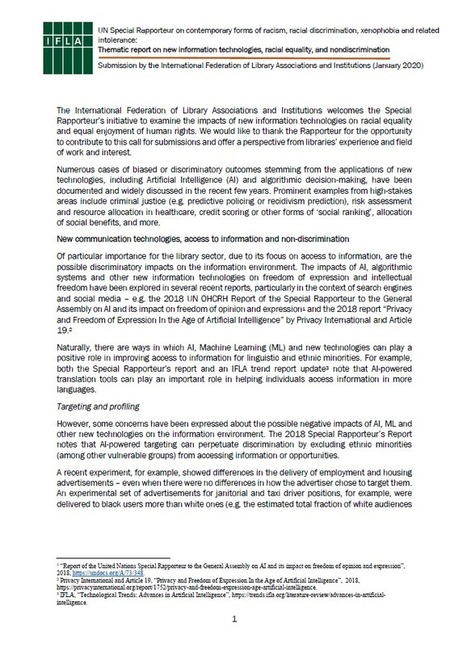



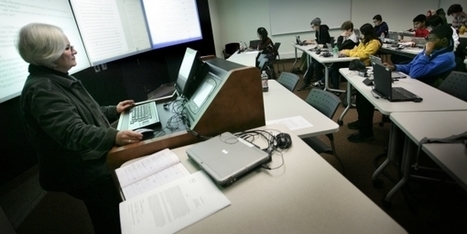
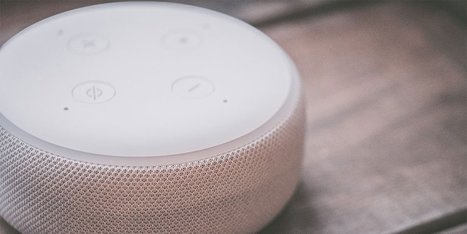
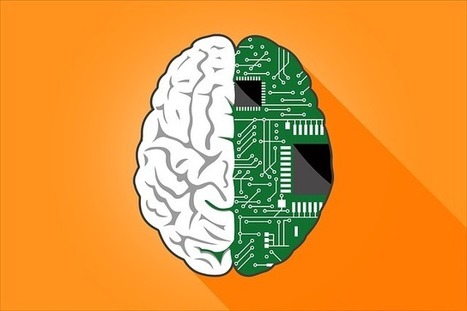
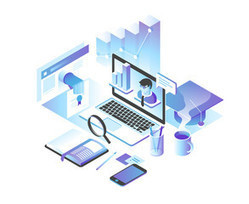

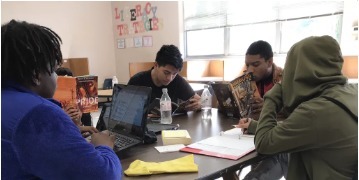


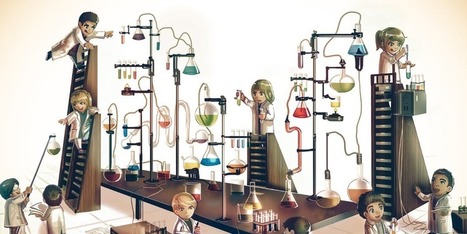


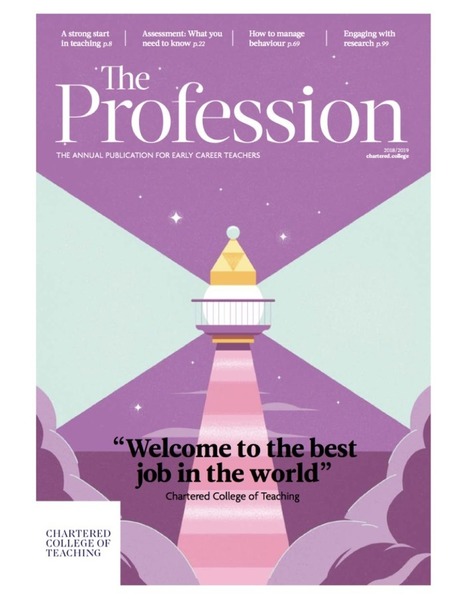
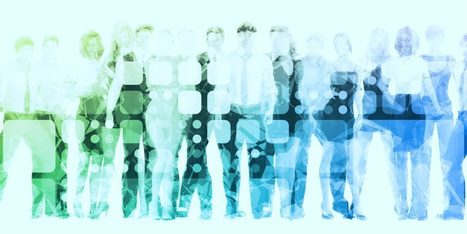

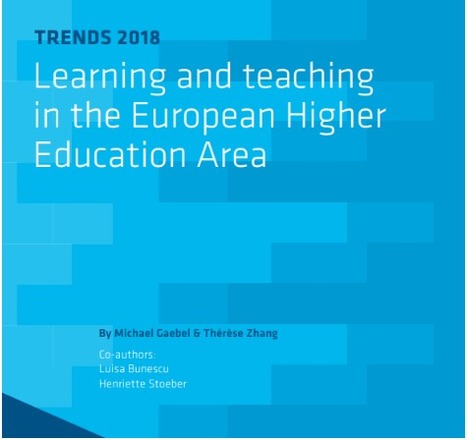
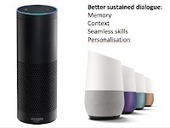





h